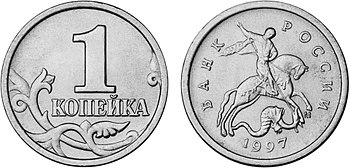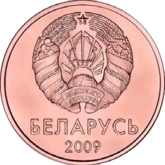| This article includes a list of references, related reading, or external links, but its sources remain unclear because it lacks inline citations. Please help improve this article by introducing more precise citations. (July 2022) (Learn how and when to remove this message) |




The kopeck or kopek is or was a coin or a currency unit of a number of countries in Eastern Europe closely associated with the economy of Russia. It is usually the smallest denomination within a currency system; 100 kopeks are worth 1 ruble or 1 hryvnia.
Originally, the kopeck was the currency unit of Imperial Russia, the Russian Soviet Federative Socialist Republic and then the Soviet Union (as the Soviet ruble). As of 2020, it is the currency unit of Russia, Belarus and Ukraine. The Russian kopeck is also used in two regions of Georgia, and the partially recognised states (including by Russia) of Abkhazia and South Ossetia. Partially recognised Transnistria has its own kopeck. In the past, several other countries influenced by Russia and the Soviet Union had currency units that were also named kopecks.
The name of the coin of Azerbaijan comes from the word kopeck – gapik (Azerbaijani: qəpik, 1⁄100 manat).
No country's kopeck is currently subdivided, although the denga (1⁄2 kopeck) and polushka (1⁄4 kopeck) were minted off and on for centuries, until the fall of the Romanov dynasty in February 1917 (O.S.)/March 1917 (N.S.).
Origins
The word kopek, kopeck, copeck, or kopeyka (in Russian: копейка, kopeyka) is a diminutive form of the Russian kop'yo (копьё)—a spear. The first kopek coins, minted at Novgorod and Pskov from about 1534 onwards, show a horseman with a spear. From the 1540s on, the horseman bore a crown; doubtless the intention was to represent Ivan the Terrible, the grand prince of all Russia until 1547, and tsar thereafter. Subsequent minting of the coin, starting in the 18th century, instead bore Saint George striking down a serpent with spear, hence kopek from kop'yo (копьё).
-
 kopeck of Ivan IV of Russia
kopeck of Ivan IV of Russia
-
 kopeck of Feodor II, circa 1605
kopeck of Feodor II, circa 1605
-
 copper five-kopecks coin of Catherine II, 1783
copper five-kopecks coin of Catherine II, 1783
-
Russian SFSR 50 kopeck coin, 1921
-
 Soviet 20 kopeck coin, 1989
Soviet 20 kopeck coin, 1989
-
 Russian 50 kopeck coin, 2003
Russian 50 kopeck coin, 2003
Expressions
In French, kopeck usually designates something of little value or interest: "cela ne vaut pas un kopek ".
Notes
- Multiple spellings depending on country:
- Russian: копейка, romanized: kopeyka, IPA: [kɐˈpʲejkə]
- Ukrainian: копійка, romanized: kopiika, IPA: [koˈpʲijkə]
- Belarusian: капейка, romanized: kapiejka
References
- The Free Dictionary. Farlex. 2011.
- Interinstitutional style guide. European Union. 2012. ISBN 978-92-78-40701-8.
- Merriam-Webster. Springfield: Merriam-Webster Inc. 2011.
- Добродомов И. Г. (1967). Некоторые вопросы изучения тюркизмов в русском языке (Вопросы лексики и грамматики русского языка ed.). М.
{{cite book}}: CS1 maint: location missing publisher (link) - Центральный банк Азербайджанской республики (Официальный сайт ed.). 2010.
This coin-related article is a stub. You can help Misplaced Pages by expanding it. |